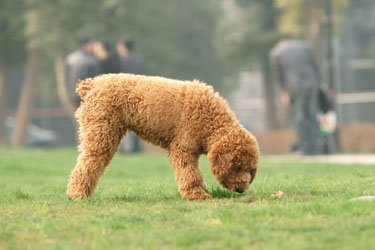Veterinarian Tips: Pets and Foreign Objects

Counsel your clients about what to look for and what to do if they believe their pet has ingested a foreign object.
Signs that Point to a Problem
One of the first signs that an animal has something lodged in its mouth is a change in its eating behavior. While this is also a sign of various mouth infections or that the animal has a problem with its teeth, an animal suffering from the pain caused by a foreign object being lodged in its mouth may act like it is hungry, but will forego eating. Other signs include:- Bad breath
- Drooling
- Gagging
- Choking
- Difficulties with swallowing
- Rubbing the mouth along the floor
- Pawing at its mouth
- Repeatedly licking the lips
- Holding its mouth open continuously.
Foreign Object Injuries
The tissues of the lips, gums, and mouth are very soft. When an animal gets something foreign stuck in its mouth, the objects can easily penetrate these tissues and become embedded. Examples of objects that are often the cause of these types of injuries include:- Bone splinters
- Wood slivers
- Porcupine quills
- Fish hooks
- Plant awns
- Sewing needles and pins
- Pencils
- Toothpicks
- Hairpins
- Burrs
- String
- Ribbon
- Rubber bands.
Finding the Problem
When an animal is observed with signs that indicate the presence of a foreign object, care must be taken to avoid being bitten or scratched when searching for the problem. Looking carefully involves the following:
- To open the mouth of a dog:
- Position a thumb into the space found behind the canine tooth
- Press up on the roof of the mouth
- When the mouth begins to open,
- Press down on the lower jaw with the opposite thumb
- To view its tongue or the back of its throat, press down on the animal’s tongue.
- Place the thumb and forefinger against its upper cheeks and press gently
- When the mouth begins to open,
- Press down on the lower jaw with the index finger of the other hand
- To view its tongue or see the back of its throat, either push down on the back of the tongue or tilt the head back.
Various Required Treatments
Sometimes a foreign object can be easily found and removed without causing any further injury to the animal. However, clients should be advised to carefully consider the following before attempting to treat embedded foreign objects:
- The presence of swelling or of a draining tract under the tongue indicates that the object has been embedded for a while and will require veterinary assistance
- If the injury is caused by a needle with an attached thread, do not pull out the thread, it can be used to find the needle
- Fish hook removals require cutting off the barbed end of the hook to push it back through the tissue, the treatment may require stitches
- Fish hooks that have become embedded should always be removed by a veterinarian
- Porcupine quill removal is painful and may require anesthesia
- Porcupine quills that fracture can cause a severe infection
- Strings or rubber bands that become wrapped around the tongue require immediate veterinary attention if they cut the tissue or constrict the blood supply because they may result in strangulation or irreversible tissue damage.
When a foreign object becomes lodged in an animal’s mouth, it is very likely the animal will require some type of veterinary assistance!
Sources:
Cat Owner’s Home Veterinary Handbook, 3rd ed., D.M. Eldredge, D.G. Carlson, L.D. Carlson, J.M. GiffinDog Owner’s Home Veterinary Handbook, 4th ed., D.M. Eldredge, L.D. Carlson, D.G. Carlson, J.M. Giffin
http://www.petmd.com/dog/conditions/traumatic/can-grass-kill-your-dog
Careers
Are you looking for a place to let your talents shine? At Covetrus, we help our practitioner customers better serve their patients and take pride in providing the best customer experience possible. Search our open positions to see our available opportunities.
Newsletter
Stay current with what’s going on with Covetrus, subscribe to receive our newsletter and email communications. Subscribers will receive the latest information in practice management, sales and marketing, animal health, and more.


Leave a comment